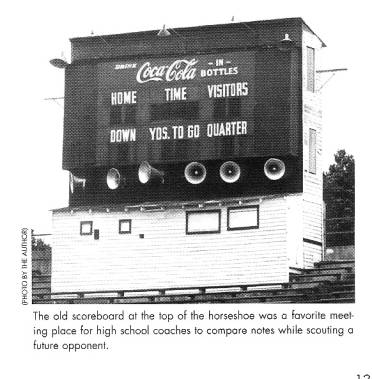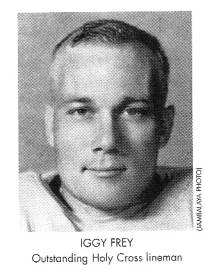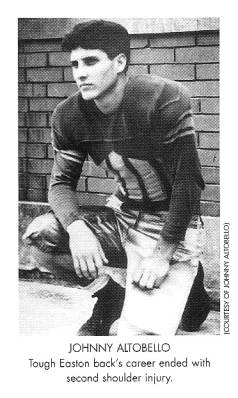The Football Tradition for the Prep League in
1937:
1937:
CLASSIC CITY PARK STADIUM COMES TO LIFE
Compiled by Ron Gravois and Dick Daigre.
There
was much news to report in the 1937 football season.
Among them was the establishment of the AA division in the LHSAA for the
larger schools. This was
necessitated due to many more schools joining the group.
Membership had climbed to 349 schools and adding a division was a
sensible and needed improvement. There
was also controversy in the games played, wherein Fortier could not make a
playoff game on a Wednesday after their Sunday season closer.
The Jesuit contest against Holy Cross was also marred by a controversial
decision. But the really big news
was the erection of the gleaming new football and track stadium at City Park, a
stadium that many of us readers recall with fondness and even continue to enjoy
to this day.
City Park Stadium, now
named Tad Gormley Stadium, was built under a grant from the U. S government in
the amount of $250,000.00. The
design had been commenced by Architect Richard Koch in 1934, following the
original petition for funding in 1933, but in 1937, the dream finally became a
reality. Interested readers are
encouraged to seek out the book, History of City Park in New Orleans, by Reeves and Reeves, for a complete description of the design and
construction of this jewel of a ballpark, that so many thousands of fans have
enjoyed for these past 65 years. The
final cost of the structure came to $563,641.
Officials of both Holy
Cross and Jesuit had petitioned Mayor Maestri to allow them to dedicate the new
stadium in their annual contest, but it was not to be. The mayor did not even
respond to the letters and the first football game held there was between Loyola
and DePaul Universities before 20,000 fans on October 20, 1937.
The first high school game to be played in the new stadium was held
between Holy Cross and St. Aloysius on November 20, 1937.
Although the contest was a double homecoming, bad weather kept the crowd
down to only 2,500 fans, with the ascendant Crusader rooters outnumbering their
Tiger counterparts by a 2-1 margin. The
Tigers won 22-0, with Iggy Frey providing most of the on-field fireworks.
One week later the new stadium was tested as Prep powerhouse Fortier
defeated Jesuit 14-6 before 30,000 fans in the 24,500-capacity stadium.
Spectators spilled over from the seats and lined the field all around
five deep or more.

Photo: Ye Olde Electric Scoreboard.
This is not the original (manually operated) scoreboard, but the second
one. How many points were
The Fortier Tarpons had
suffered a terrible loss when their star quarterback, Pershing Cashen, was
declared ineligible before the season began, because he had already accumulated
160 academic points and the School board would not let him play for his fifth
year. Jesuit was not so fussy about
such matters. They signed him up
for extra classes and he starred at halfback for the Jays in 1937.
As for the city
championship, Fortier and Warren Easton ended up tied with identical 5-1 Prep
records. Holy Cross was third at 3-1.
Jesuit dropped two league games, to Easton and Fortier, and finished in
fourth place. The LHSAA
commissioner ordered a playoff game between the two top teams, but the Tarpons
refused to play the game, after a long and tiring season.
They felt that they were the best team and should be champions. The playoff game would have had them playing as many as three
contests in a single week.
In the key Holy
Cross-Jesuit contest, the final score showed the teams tied at 6-6.
First downs were even at five apiece and Jesuit prevailed on penetrations
by 4-1; however, the officials admitted that they did not keep a written record
of these statistics. The Holy Cross
principal later contested the findings and declared that the Tigers had made
more first downs. Eventually the
league ruled the game officially as “no contest,” due to this discrepancy
and today, no one can say if the Tigers really did win on first downs.
Had they had the win and had they played an additional game against a
weak league foe, they would have been tied for the title.

For a “lineman,” Iggy made one
helluva quarterback. He was one
of the Tiger All-Time Greats.
Warren Easton went on to
the state finals and lost to Byrd High by 14-6. Byrd took their unprecedented fifth state title.
On the day the downcast Eagle team rode the train back to New Orleans,
Fortier held their sports banquet and the Coach Pizzaro toasted the team as the
“Uncrowned Champions.”

Now, for the official
article on the game played on Saturday, Oct. 16, 1937
Copyright (c) 1937 The
Times-Picayune Publishing Co.
*
* * * * * * * * * * * * * ** * *
HOLY CROSS AND JESUIT IN 6 TO 6 TIE
Crowd of 9000 Sits in Rain to See Game
Connie Ryan’s Kicking Bright Feature of Night Battle
By
N. Charles Wicker
A crowd of 9000 excited, cheering fans sat in the rain through a thrilling football duel between Holy Cross and Jesuit high schools Saturday night at Loyola Stadium. It was one of the keenest battles witnessed on a local prep gridiron in years and at the end the point score favored neither, the game winding up in a 6 to 6 tie, after both teams had thrown all of their resources into the fray to no avail.
However, regardless of their valiant battle, which found
them coming back in the third period and fighting their way to a touchdown to
even up the count with the Jays, who had tallied in the first quarter, the
Tigers will have a defeat charged against their prep record. While they held the Jesuits even in points and first downs,
the Tigers were margined in penetrations beyond the 20-yard line, 4 to 1, and
therein lies the tale.
Blocks Kick
After an exchange of punts, which found the Jays gaining plenty of yardage, especially as a result of a 65-yard punt by Connie Ryan – William Stroebel and Phillip Bruno got through and blocked Caballero’s kick, which Stroebel recovered on the Holy Cross 12-yard line, from where the Jays scored a touchdown.
With Hauth and Ryan carrying the ball, they Jays were able
to advance the oval to the one-yard line. One
play at the line failed and on the next try, the Jays were penalized five yards
for offsides. A five-yard pass from
Connie Ryan to Jack Webb again placed the ball on the one-yard stripe, from
where Hauth went off of right tackle for the score.
Hauth’s try for the extra point from placement was wide.
Some fine kicking by Ryan kept the ball in Tigers’
territory during the rest of the first period.
Taking the ball on their own 20-yard stripe three plays
before the first quarter ended, the Tigers, aided by a 15-yard penalty, got the
ball on their own 35-yard line. On
the first play, Vincent Crespino shot a long pass to Herbert Ayres, who got
behind the Jesuit safety. The ball
fell incomplete, but Field Judge Joe Tetlow ruled interference on the Jesuit
25-yard line. In four tries, the
Tigers gained but eight yards and the ball went over to the Jays on their own
17-yard line.
Forcing the Jays to kick, the tigers took the ball on their
own 40-yard line and a nice 22-yard run by Crespino planted the ball on the
Jays’ 33-yard line, where Crespino quick-kicked out of bounds on the Jays’
eight-yard line.
Ryan kicked on first down to his own 36-yard line.
On the first play, Samartino lateralled to Cardinale, who gained nine
yards, but on the next play, Cardinale fumbled and the Jays recovered.
Crespino’s punt was downed on the Jays’ 10-yard line.
One play at the line gained one yard and, on the next play Connie Ryan,
back to punt, was smothered for a six-yard loss.
A poor kick by Key gave the Tigers the ball on the Jays’
27-yard line. From there the Tigers
marched to a score when a fourth-down pass from Vincent Crespino to Samartino, a
“sleeper” man, placed the ball on the Jays’ one-yard line, from where
Crespino went over to tie the score.
Crespino’s try from placement was low.
The Tigers, featuring great running by Crespino, got into
Jays’ territory after they tallied the tying touchdown, but couldn’t get
past the Jays’ 35-yard line.
Ryan Punts Nicely
Another beautiful kick by Ryan, which was
downed on the Tigers’ 15-yard line and a holding penalty put the ball on their
own one-yard line.
Connie Ryan took a kick on the Tigers 35-yard line and
advanced it to the Tigers’ 26-yard line and a first down followed but the Jays
fumbled and the Tigers recovered on the Holy Cross 17-yard line to stop the
threat.
The Jays got into the Tigers territory when the fourth
period was half over. Connie Ryan
kicked and when the Tigers’ safety man fumbled the ball, Harold Hooper
recovered.
The Jays, aided by an offside penalty, netted five more
yards to register a first down. This
means a lot, because of a new state rule that says in case of a tie, first downs
rule and if first downs are tied penetrations rule next.
The Tigers were minus one of their stellar backs, Ignatius
Frey, a brother of Captain Larry, who played a great game. Crespino was the Tigers’ offensive star, while Hickey and
Ayres looked good in the Holy Cross line.
Sharing the honors with Ryan for the Jays were Harold
Hooper, William Stroebel, Phillip Bruno and Charley Miller.
The Lineups:
Jesuit (6)
Holy Cross (6)
Miller
L.E.
Ayres
Bruno
L.T.
Winchester
C. Hooper
L.G.
Metgan
Stroebel
C
(c) Frey
Scofield
R.G.
Routher
Brown
R.T.
Hickey
H. Hooper (c)
R.E.
Malarcher
Ryan
Q.B.
Cardinale
Flettrich
R.H.
Catalano
Hauth
L.H.
Martinson
Webb
F.B
Crespino
Substitutes:
Holy Cross: Barker, McKenna, Samartino, McCall, Young
Jesuit: Kenny Smith, Cahill, Scofield, Key, Pierce Smith
Penetrations: Jesuit 4, Holy Cross 1
* * * * * * * * * * * * * * * * * * * * * *
Cumulative record, Jesuit leads the series 12-2-2
1936 Season Record: Jesuit:
Behrman
12-6
Bogalusa
0-0
St. Aloysius
22-0
Holy Cross
6-6
Commercial
24-6
Baton Rouge
9-6
Bolton
6-6
Ponchatoula
38-0
Fortier (L)
6-14
Warren Easton (L)
0-7
Picayune, Miss.
8-0 (Toy Bowl)
Season Record: (6-2-3)